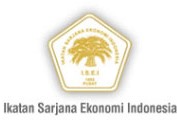The Analyses of Household Income and Dependence on Forest Resources
(1) Sekolah Tinggi Ilmu Ekonomi Semarang
(2) Economics Development Department, Faculty of Economics, Universitas Negeri Semarang
Abstract
Keywords
Full Text:
PDFReferences
Antonopoulos Rania. 2008. The Unpaid Care Work - Paid Work Connection. Working paper No 541: The Levy Economics Institute
Axco Dominico, 2007. Time Alocation Between Work Family Over The Live-Cxall A Comparative Gender Analisis of Italy, France Sweden and The United states: IZA_DP No 3193
Balcels Laia Ventura, 2009. Analysis the Devision of Household Labor Within Spanish Families. Revista International De Socialogis. Vol 67, 83–105 (2009).
Becker S Garry, 2006. A Theory of the Allocation of Time : http : // www.jstor .org
Eachren MC William , 2002 (terj ) ,Economic : A Contempory Intruduction , Jakarta : Salemba Empat
Food and Agricultural Organization of United Nation, 2010, Developing Effectives Forest Policy. FAO Foresty Paper 161
Gujarati, D. 2003. Basic Econometrics. Fourth Edition. Mc.Grow-Hill: New York.
Kraft Kornelius and Neiuman Stephanie, 2009, Effect of Labor Devision between Wive and husband on the Risk of Divorce: Evidence from German Data: IZA, DP No 4515
Maduma John K and Peter Wobst, (tt) Determinats of Rural Labor Market Participation in Tanzania: University of Bonn: Center for Development Research (ZEF)
Nicholson Walter, 2005, Micro Economic Theory : Basic Principles and Extension ( Ninth Ed ) , USA : Thomson South Western
------------------ , 2002 (terj), Mirko Ekonomi Intermediate dan Aplikasinya (edisi delapan), Jakarta : Erlangga
Palmquist B Raymond, Phaneuf Daniel and Smith Kerry. 2007. Measuring The Values For Time. Cambridge : Working Paper Series MA 02138 .2007
PP Menteri Kehutanan No P- Juli 2007, Rencana Makro Pemberdayaan Masyarakat di dalam dan di Sekitar Hutan. Jakarta: Departemen Kehutanan RI.
Purwita, Tjipta dkk (2009), Analisis Keragaan Ekonomi Rumahtangga “Studi Kasus Pengelolaan Hutan Bersama Masyarakat di Pangalengan Bandung Selatanâ€. Jurnal Penelitian Sosial dan Ekonomi Kehutanan Vol. 6 No. 1. IPB Bogor
Sultana Nargis et all, 1994, Determinat of Female Time Allocation Selected Districs of Rural Pakistan: The Pakistan Development Review 33: 4 Psrt II pp 1141 – 1153
Winters Paul, 2009, Asset, Activities, dan Rural Income Generation: Evidence From a Multi Country Analysis. Agricultural and Resources Economics. Vol. 37 No. 9
Refbacks
- There are currently no refbacks.

This work is licensed under a Creative Commons Attribution 4.0 International License.






